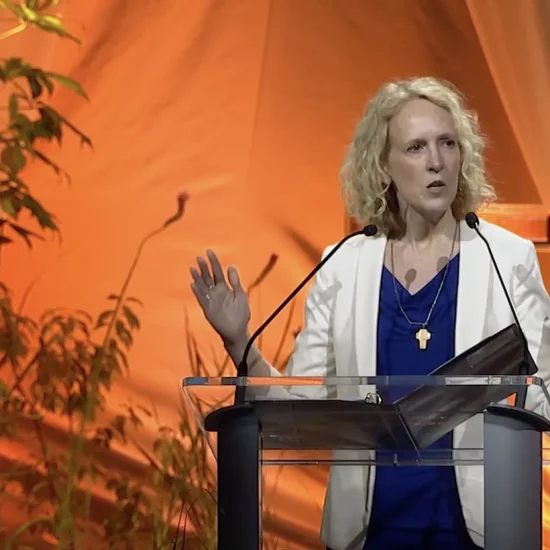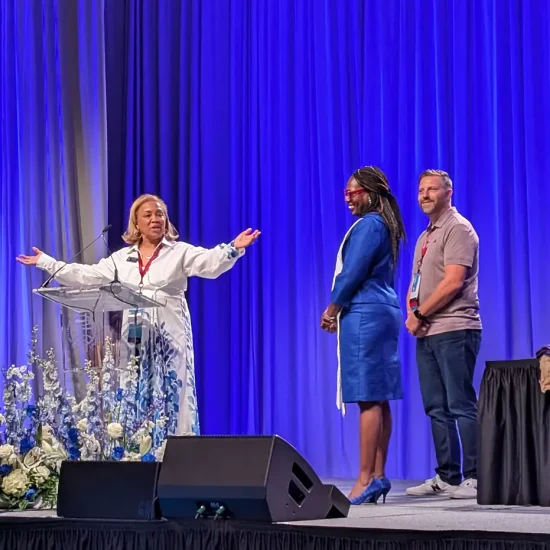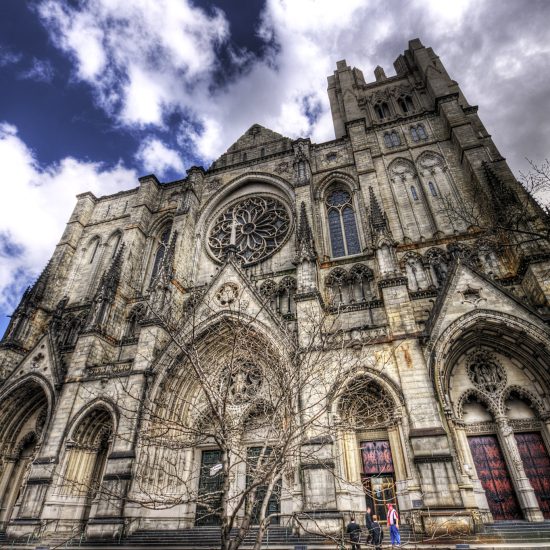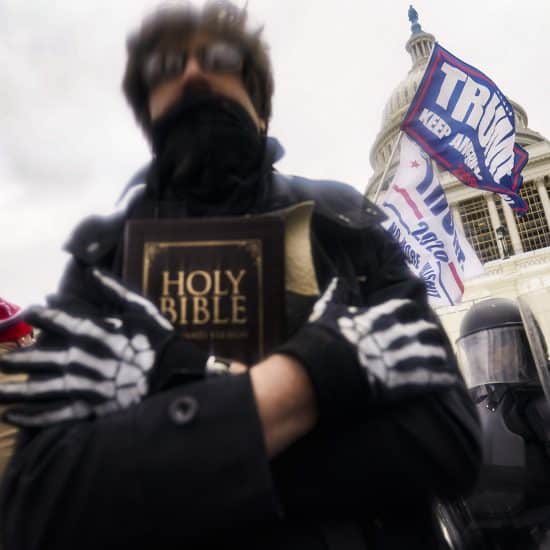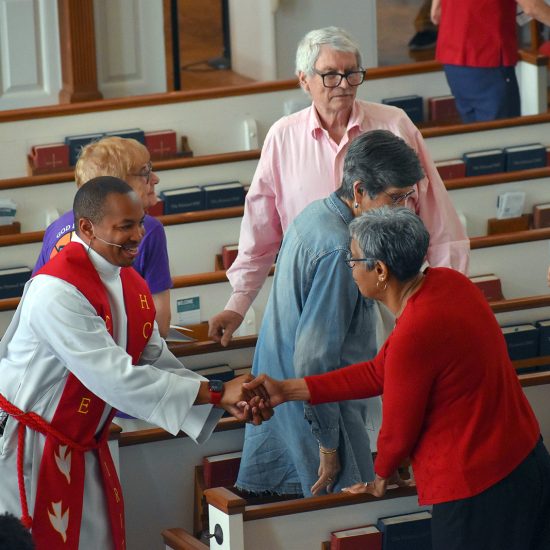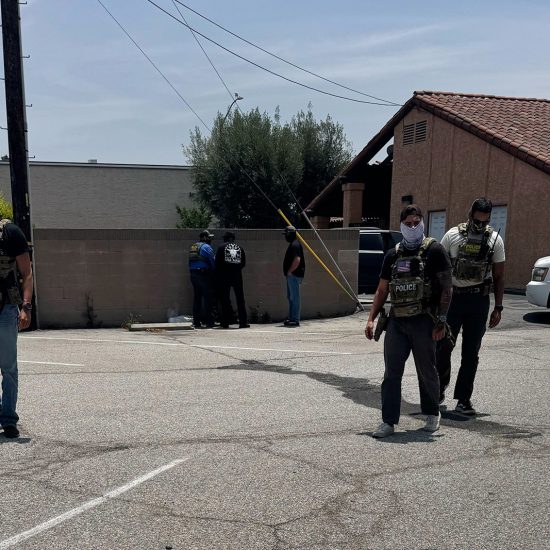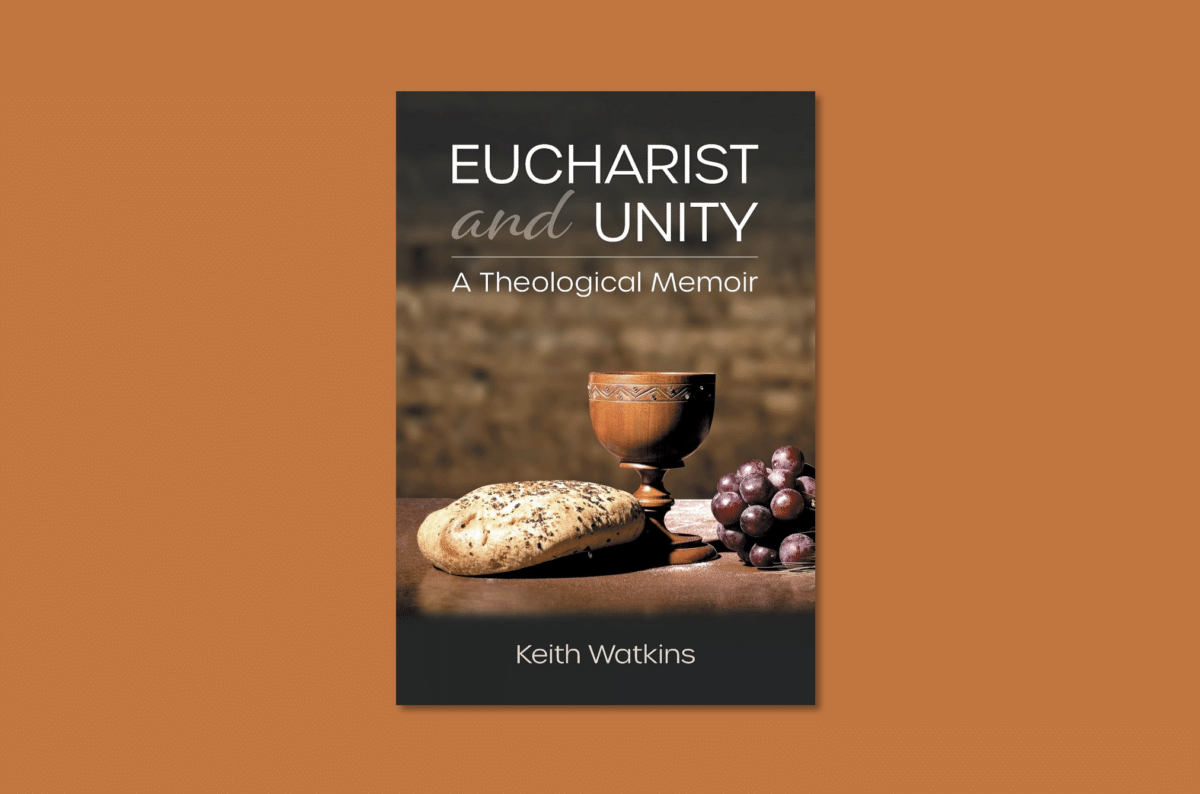
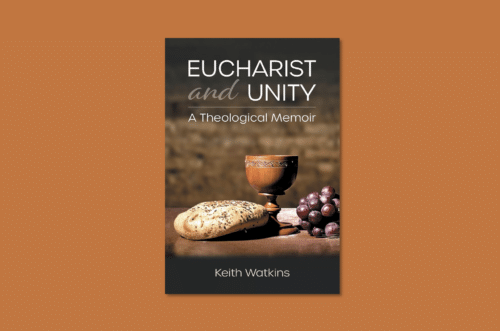
EUCHARIST AND UNITY: A Theological Memoir. By Keith Watkins. St. Louis, MO: CBP/Disciples of Christ Historical Society, 2023. Vii + 182 pages.
The Christian Church (Disciples of Christ) is a Mainline Protestant tradition born in the USA soon after the turn of the nineteenth century on what was then the frontier (Western Pennsylvania and Kentucky). The denomination is marked by its commitment to Christian Unity as well as weekly (if not more frequent) celebration of the Lord’s Supper (Eucharist). In many ways, the Disciples are like the Roman Catholic Church in that the Disciples have centered their theology and practice in the Eucharist. With the Eucharist (Lord’s Supper) standing at the center of its identity the movement that produced the Disciples as a denomination has sought to pursue the unity of the visible church of Jesus Christ by gathering at the Table. One of the key figures in recent ecumenical and liturgical conversations among Disciples is Keith Watkins. Keith is an ordained Disciples minister and emeritus professor of worship and practical theology at Christian Theological Seminary. He has offered his most recent book Eucharist and Unity to the larger church in the form of A Theological Memoir.

Robert D. Cornwall
What I offer here is not a truly objective review, since Keith is a friend and a mentor. I read an earlier version of this book, which Keith completed in 2002, but did not pursue publication at that time. I have that original manuscript, that is covered with many notes, comments, and questions that I intended to share with Keith. While I didn’t hand off my copy to him, I did share my thoughts with him, but that was a very long time ago. Although the bulk of the book was written in 2002, he has brought it up to date, such that chapter five in the published book is quite different from what was originally written.
Diana Butler Bass wrote in the introduction to Freeing Jesus her definition of a theological memoir that I think fits what Keith has done here in Eucharist and Unity. Diana writes in her book that it “is an exercise in memory—remembering then, with all the nostalgia, sorrow, and joy memory summons. It is also an exercise in now, taking the lessons once learned and applying them to the present. And it is an exercise in what can be, having a certain confidence to keep on the way amid even radical challenges” [Freeing Jesus, Harper One, p. xxvi]. With that definition of a theological memoir in mind, we turn to Eucharist and Unity. Since it takes the form of a theological memoir, Keith looks back at his life, detailing the journey he took from his youth in Portland, Oregon, through his college and seminary years, followed by several years serving a pastorate in Central California, followed by graduate studies in church history. This ministry and education served as the foundation for a call by Christian Theological Seminary in Indianapolis (the same seminary where he had earlier studied), where he took up a position teaching worship and practical theology. Soon after he began his teaching career Keith became involved with the ecumenical ventures of the Disciples. Most specifically he participated in the work of the Consultation on Church Union, which was launched about the time he began his teaching career. Being part of the Disciples delegation to COCU, he participated in the liturgical discussions undertaken by the COCU participants. Keith would later write a history of COCU under the title: The American Church that Might Have Been: A History of the Consultation on Church Union, (Pickwick Publications, 2014).
Memoirs usually attempt to place one’s life story in a larger context, that is true here. Keith notes that the year he was ordained, 1953, “the world was creating its post-war identity.” Then a decade later the return to normality of the 1950s gave way to a “state of fibrillation,” with the war in Vietnam and the eruption of the Civil Rights Movement. The year that Martin Luther King, Jr. and Robert Kennedy were assassinated, he and his family were living in Seattle, where he was taking a sabbatical while serving at leading Disciples church, a year that gave birth to his book Liturgies In a Time When Cities Burn. In other words, the years of his ministry in church and academia took place during difficult times. In these years the Mainline Churches struggled with identity and found themselves in decline. We see much of this reality present in Keith’s reflections.
Keith tells us that his religious/theological roots are to be found in the more conservative part of the Stone-Campbell Movement, what is today known as the Christian Churches/Churches of Christ. As a youth, he became involved with a congregation in Portland, Oregon that was conservative in its theology and practice. He then attended Northwest Christian College (what is now Bushnell University) in the early 1950s. It is the same college that I would graduate from in 1980. Interestingly, we had at least one professor in common (Lawrence Bixler). His time at NCC essentially reinforced his conservative theological positions, except that during a student ministry, he was faced with the question of the relationship of baptism by immersion to congregational membership. The question of whether one must be immersed before being admitted to membership would continue to unsettle him as he headed to seminary at what was then Butler School of Religion (later Christian Theological Seminary). If his time at NCC reinforced his theological commitments, his seminary years would raise theological questions that pushed him ever leftward, even though he remained anchored in his Disciples roots.
After seminary, Keith answered a call to serve as pastor of a Disciples congregation in Central California, an experience that would give way to graduate study in Church History at Pacific School of Religion. While he was studying at PSR, he was called to a teaching position at Christian Theological Seminary. With that call, Keith began a long and fruitful career that included teaching and writing (mostly on matters related to liturgy and the Lord’s Supper). His time at CTS also allowed him to serve the larger Disciples community and the larger ecumenical church. Thus, it was in these different places that Keith engaged with both the Eucharist and Christian Unity. As we discover in reading Keith’s memoir, Eucharist and Unity are deeply intertwined in Keith’s life story. Regarding the Eucharist and liturgy, Keith wrote several books that deal with those subjects, books that have helped Disciples think more deeply about what happens at the Table. Perhaps most importantly, he set these discussions within the larger ecumenical conversations.
Reviewing a book like this is difficult because it is deeply personal, and the personal nature of the reflections needs to be read appreciatively to fully understand the message. As we read Keith’s reflections, we discover the presence of both joy and lament. One of his later books, which I noted earlier, is discussed in Chapter 5. It tells the story of the Consultation on Church Union. The story of the movement is lovingly told in that book and here in the memoir, but it also includes wistful reflections. That is not only because Keith placed great hope that a unified church might emerge, but also because of the work undertaken during the several decades of the consultation’s existence. Part of the reason for that wistfulness is that Keith devoted considerable time and energy to that work, which has left little impact on the churches. Not only did the churches involved not fully embrace each other’s ministries and sacraments, but the work undertaken has not influenced either the ecclesiology of the churches or their liturgies.
While there is much in this memoir that speaks of the search for Christian unity, Keith also shares his thoughts about how the church has functioned, liturgically and practically. Besides the years spent in teaching, after retiring from CTS, he spent time in the parish as a church-planting pastor in Arizona and as an interim pastor in several churches. These experiences allowed him to think through what the church might look like considering the culture. He envisioned what he calls “Churches of the Third Type” (chapter 4). In that chapter, he ponders directions that might have been taken and can be taken due to the realities facing the churches that have seen decline and diminishment since the heyday of the Mainline in the 1950s. His vision is one where both word and table stand at the center of church life.
As his memoir draws to a close, Keith shares his thoughts about the dimensions of his life in the years since he first began writing this memoir in the early 2000s. He tells of life in retirement, including his beloved cycling, along with his return to being the historian he began preparing for in graduate school, together with his continued service to the church that has been the center of his life from his youth. That includes his continued involvement in the work of Christian unity.
In the course of reflecting on his life and work during his later years, he tells of attending a service in Arizona that celebrated the “Formula of Agreement” linking the Evangelical Lutheran Church of America, the Presbyterian Church USA, the Reformed Church in America, and the United Churches of Christ, a formula that regularized the ministries and sacraments of these four communions. He writes that as he experienced that service, he lamented that the Disciples were absent from that agreement. Serving as I do as a board member of the Disciples ecumenical ministry and co-chair of a bilateral dialog with the ELCA, I share Keith’s lament at our absence from that agreement. I have thought hard about our absence and his lament confirms my own thinking. Like Keith, I’ve asked why we were not there since we have been in full communion with the United Church of Christ. This agreement took place not long before COCU began moving toward becoming a different entity, which would no longer pursue the creation of a united church. When Churches Uniting in Christ was born, one element from the earlier conversation that was dropped was the regularization of ministerial orders. While the participating churches in this new entity would recognize each other as authentic expressions of the one Church of Jesus Christ, they would not continue pursuing mutual recognition of their ordained ministries.
I’ve noted here the lament that is present in the book, but this sense of lament is a natural expression in a memoir such as this, for in my estimation, for someone who devoted so much energy to the pursuit of unity at the Table, but to this point that unity has yet to make itself fully visible. Nevertheless, while lament is present here, Keith also includes words of thanksgiving and gratitude for his life and ministry in the Disciples and the larger church of Jesus Christ. Eucharist and Unity, which I know was lovingly written, is truly a gift to the larger church from one who has been committed to its unity. While it expresses a clear ecumenical vision of the larger church, Eucharist and Unity is Disciple through and through. It is, therefore, a book that is worth reading closely, whether one is a Disciple or not. Readers might not recognize all the names and figures mentioned in the book, but the story told here is pertinent. Ron Allen, in his foreword to Eucharist and Unity, captures the essence of what we find in this book, noting that since this is an age of memoir, “in the best memoirs the authors do not simply report autobiographical details but reflect on the meaning of their lives in the larger contexts in which they lived,” that is what we find here. It’s not just nostalgia for what has been but connects one person’s life with the larger world in which it was lived (p. v.) Since Keith is still living and active, his story and his contributions to the life of the church continue, for that, we can continue giving thanks.
This review originally appeared on BobCornwall.com.
Robert D. Cornwall is an ordained minister in the Christian Church (Disciples of Christ). Now retired from his ministry at Central Woodward Christian Church (Disciples of Christ) of Troy, Michigan, he serves as Minister-at-Large in Troy. He holds a Ph.D. in Historical Theology from Fuller Theological Seminary and is the author of numerous books including his latest “Second Thoughts about the Second Coming: Understanding the End Times, Our Future, and Christian Hope” coauthored with Ronald J. Allen. His blog Ponderings on a Faith Journey can be found at www.bobcornwall.com.

